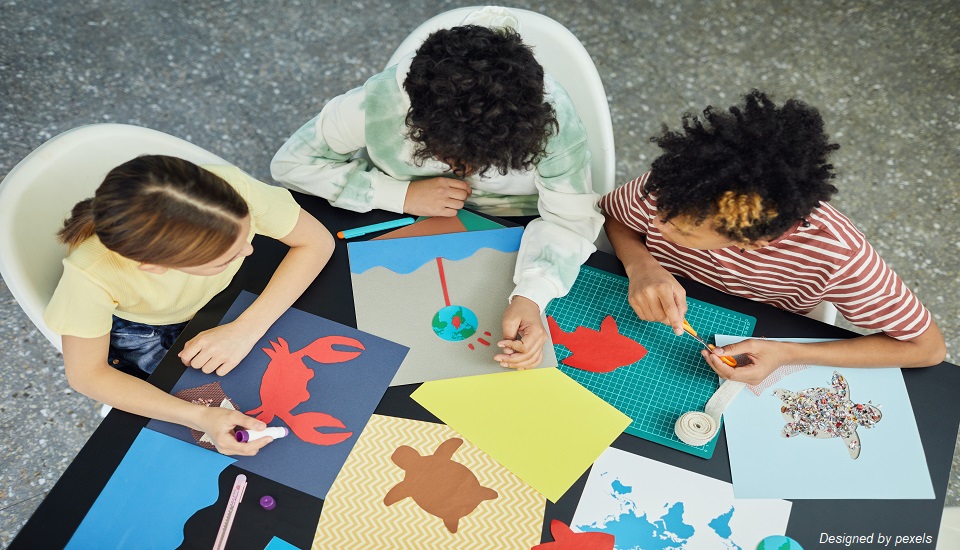Process Art: Paving A Path For The Toddler To Adult Journey
9th December 2022

Children are born with talents. They love to sing, dance, draw and create. However, they are often laid back with frustrations for not being able to produce an image resembling the vision in their head. This is when their art becomes representational, and they set limitations for themselves where certain things are supposed to look a certain way.
When their craftwork doesn't morph into the way they want them to, it creates a sense of hate and resentment. To prevent this from happening and help children develop a growth mindset, you should imbibe the concept of process art in them.
But before we dive into the why and the how to let us first understand what process art is anyway ---
What Is Process Art?
Process art is as simple as the name sounds. It is all about emphasizing the process of creating art rather than focusing on the finished product. The term refers to the fact that the process remains a prominent aspect of the completed work rather than being hidden.
This type of art nurtures emotional and social health and reinforces skills like focus, relaxation, emotional sharing, and self-esteem. It also enables toddlers and preschoolers to develop cognitive skills like problem-solving, planning, prediction, and comparison.
When a Montessori teacher enforces process art, it basically means that they are giving wings to the child's imagination. In such cases, eyes do not have to appear in pairs, trees do not have to be colored green and their colors do not have to be constrained inside meandering lines. In short, the art created by the little kids does not have to be recognizable or resemble anything at all. This art thrives without limitations and the only requirement is for the artist to enjoy the creative process of creating something.
Why Is Process Art Important?
This type of art is developmentally appropriate for kindergarteners and preschoolers as they are yet to acquire self-awareness to represent objects and fine motor skills. At this stage children just enjoy experimenting with art and craft objects and let their imaginations run wild on what they can create with them.
These activities are often open-ended and hence foster curiosity and encourage sensory exploration. With process art, creativity flourishes as it is pursued with one's own enjoyment. This art is also rich in developing:
- Fine motor control and coordination
- Sensory exploration
- Spatial reasoning
- Cognitive development through problem-solving, planning, and comparison.
- Emotional and social maturation through increased focus
- Feeling success and pride through collaboration with others
Astonishing Benefits Of Process Art
- Improves Fine Motor Skills
While performing any art and craft activity kids are using the muscles in their hands and fingers that enhances their ability to manipulate small objects. Activities such as drawing, coloring, cutting, gluing, building, and painting develop fine motor skills by strengthening the small muscles in their hands, wrists, and fingers.
- Develops Creativity
When children are participating in process art activities, they are free to make their own choices. Since there are no limitations or boundaries they can experiment with various materials, colors, and resources and use their imagination to create new things. They are also able to come up with new ways of doing conventional things.
- Engages In-Play
For toddlers and kindergarteners, learning primarily happens through play. Thus, introducing process art at this stage is a good way to make them aware of the world surrounding them. Through playful activities, they can engage in real-time objects while having fun.
- Builds Literacy Skills
Process art activities set an environment for the kids to engage in conversation, make collaboration and try new things. This also enables them to learn from each other, build new vocabulary, and express various emotions. Additionally, since they will be using too much of their hand muscles, it will also open up the avenue of early writing.
- Fosters Decision Making
Since kids can make their own choices in this type of art, they will learn to be more independent. There is no right or wrong way to approach these activities hence students can make their own decisions. They can decide what to create and how to create it.
- Improves Confidence
With independence comes confidence. With children being able to try new things their way, it builds self-confidence and self-esteem. Since exploration and originality of free thinking mark this art form, they can create more unique pieces without any imitation. They can experiment, play, learn and grow all at the same time.
Final Takeaway
Dealing with toddlers and preschoolers can be daunting and exhausting. Thus, considering a Certificate in Early Years Care and Education can give you the required headstart. The job of a Montessori teacher towards these creative beings is to facilitate their learning experience and makes space and materials for as many projects as possible. You should gently guide them when required and watch them throve and shine through their own mistakes and errors.
Leave a comment!
Looking for earning a Certificate in Early Years Care and Education? If yes then call us at 1800 212 6400 or + 919739615888. Chat with our expert if you have any questions, send us an email at to act@asiancollegeofteachers.com to find out more.
Written By: Sonal Agrawal